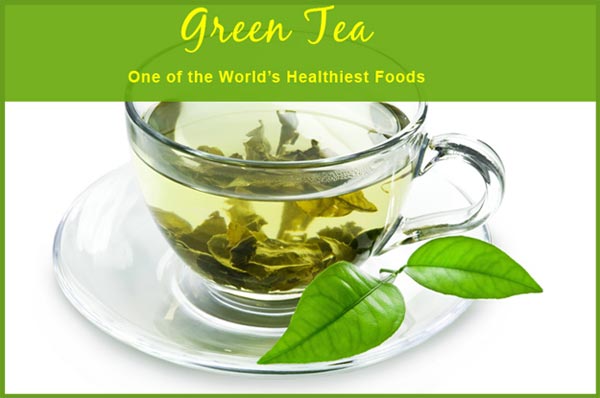|
Green tea is one of the world’s healthiest foods, and is second only to water as the most consumed beverage in the world. It has been used medicinally in China and India for centuries. The active constituents in green tea are its powerful antioxidants: polyphenols (catechins), and flavonols. One cup of green tea has more polyphenols than one serving of: spinach, broccoli, red wine and pure pomegranate juice.
The powerful antioxidant activity of the polyphenols found in green tea helps protect the body from oxidative damage, which can cause diseases such as: cancer, cardiovascular diseases, osteoporosis, and aging-related illnesses to name but a few.
Following is a very small sampling of the study abstracts of clinically conducted trials and professionally written reviews by scientific researchers in praze of this amazing tea.
Alzheimer’s Disease –In this recent 2013 study, researchers at the Michigan Alzheimer’s Disease Center discovered that a flavonoid in green tea (ECGC) bound to the toxic protein, beta-amyloid, which is responsible for many of this disease’s symptoms. Once this binding occurred, the beta-amyloid protein was less likely to form into the plaques that cause Alzheimers.
(Source)
Arthritis - This study determined the efficacy of orally administered green tea polyphenols, GTP (i.e., the antioxidant extracted from green tea), on collagen-induced arthritis in mice. In three independent experiments, mice given GTP in water exhibited significantly reduced incidences of arthritis.
(Source)
Breast Cancer – This clinical review states that, to date, the epidemiological data indicates that consumption of five (5) or more cups of green tea a day shows a non-statistically significant trend towards the prevention of breast cancer development. Moreover, according to this review, evidence suggests that green tea consumption may possibly help prevent breast cancer recurrence in early stae (I and II) cancers.
(Source)
Cholesterol - Green tea is effective in preventing cholesterol & lipid absorption in the gastrointestinal tract.
(Source)
Dementia – A symptom of Alzheimer’s Disease. See Alzheimer’s Disease above for green tea benefits.
Digestive Cancers – In this large, prospective, cohort study, supported by the National Cancer Institute, tea consumption (mostly green tea) was associated with a reduced risk of all digestive ( i.e., colorectal, stomach and esophageal) cancers in Chinese women. Moreover, the reduction of risks increased as the amount of years of tea consumption increased.
(Source)
Halatosis (Bad breath) – Not only is Green tea effective in preventing tooth decay, according to this study, green tea polyphenols can abolish halitosis through modification of odorant sulphur components.
(Source)
NonAlcoholic Fatty Liver Disease (NAFLD) – Green tea is rich in polyphenolic catechins that have hypolipidemic, thermogenic, antioxidant and anti-inflammatory activities that might mitigate the occurrence and progression of NAFLD. This review presents the experimental evidence demonstrating the hepatoprotective properties of green tea.
(Source)
Osteoporosis – Administration of green tea may be beneficial in mitigating bone loss in the elderly, and decreasing their risk of osteoporotic fractures. This scientific review suggests that green tea polyphenols (GTP) supplementation mitigates bone loss and microstructure deterioration by enhancing bone formation and suppressing bone erosion which results in a larger net bone volume.
(Source)
Skin Health - A 12-week study with women found that green tea catechins, which are naturally occurring polyphenolic compounds that have a variety of therapeutic properties, are able to improve a variety of skin characteristics, including elasticity, roughness, scaling, density, and water content. Additionally, less UV radiation damage was seen in the group that supplemented with the green tea sourced polyphenols as well.
(Source)
Tooth Decay - Green tea is effective in preventing dental caries (soft, decayed areas of a tooth).
(Source)
Weight Loss - According to this scientific study, “Green tea has thermogenic properties and promotes fat oxidation beyond that explained by its caffeine content. The green tea extract may play a role in the control of body composition via sympathetic activation of thermogenesis, fat oxidation, or both.”
(Source)
In another study, though there were no influences on glucose levels, significantly “increased satiety and fullness" were reported by the study participants after the consumption of green tea.”
(Source)
back to top of page Following is a listing of the Green Tea products that we offer for sale. Please click on a name for more information: |









